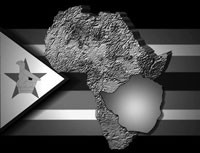Journalists see Zimbabwe’s land crisis up close

HARARE, Zimbabwe (PANA)–The Zimbabwe government has seized a farm belonging to the country’s last White colonial ruler under its controversial land reform program, officials and the former leader said, recently.
Ian Smith declined to give details, saying only that he would try to get back his 4,000-acre Gwenoro farm in the central district of Shurugwi, which he has owned for decades.
“I will try to solve my problem on my own,” he said.
Mr. Smith’s farm was among 250 White-owned farms the government had listed in recent weeks for acquisition to resettle landless peasants under its agrarian reforms. Mr. Smith was the last prime minister of Rhodesia, Zimbabwe’s colonial name, and handed over power to President Robert Mugabe after being defeated in elections in 1980.
He has remained a stern critic of the Zimbabwean leader, who led a bitter seven-year guerrilla war to dislodge him from power.
Under the agrarian reforms, the government has seized thousands of farms from White farmers–who monopolized ownership of prime land in the country–to resettle landless Black peasants. More than half a million people have been resettled on reclaimed farms in the last three years.
Critics of the program, however, blame current food shortages in the country on the farm seizures. Mr. Smith’s farm had been spared in the past three years, and the government even chased away landless peasants who forcibly occupied it in the past, demanding resettlement.
During his Aug. 11 Heroes Day speech to the nation, Pres. Mugabe noted the price paid to reclaim a nation and land seized by colonizers.
“Heroes Day evokes in us that undying, unyielding and unfalte-ring sense of pride that was born in 1980, when we first took our rightful place in the family of nations, the selfsame sense of pride that bids us to continue gallantly to defend our country today,” he said.
“This National Shrine where our national heroes are buried is a symbol, and thus a reminder, of the bitter and protracted armed struggle that was fought to remove foreign domination so we could regain our rightful control over our land and other resources.”
Noting the economic and civil crises looming over the country, Mr. Mugabe cited economic sanctions imposed by the United States and Britain, coupled with three years of drought.
The land crisis has sparked protests by the main opposition party, the Movement for Democratic Change (MDC). Pres. Mugabe signaled that an effort to bring the government and the opposition to the table for talks has stalled.
“There cannot be unity with the enemies of the people. Those who seek unity with us must not be enemies. Those who would go together with our enemies abroad cannot want to march alongside us as our partners,” he said, referring to the MDC, though not mentioning the party by name.
“No, we say no to them,” he said.
Pres. Mugabe commended President Thabo Mbeki of South Africa and Nigeria’s President Olusegun Obasanjo for refusing to “pander to the whims of America and Britain to cause commotion and instability” in Zimbabwe.
“Zimbabwe has received outstanding support and greater solidarity from our African brothers, notably Thabo Mbeki of South Africa and Olusegun Obasanjo of Nigeria, and we really commend them for that,” said Mr. Mugabe.












